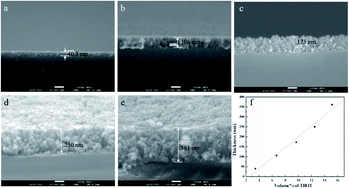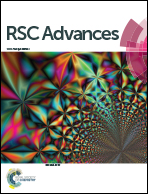Photocatalytic degradation of rhodamine B catalyzed by TiO2 films on a capillary column
Abstract
TiO2 films on a capillary column were prepared using tetrabutoxytitanium as a source of TiO2 via the sol–gel method. The film thickness showed a linear increase with tetrabutoxytitanium concentration. The specific surface area of the film was improved by adding polyethylene glycol with different molecular weights. Under optimal conditions, the prepared film had a good mesoporous structure with specific surface area of 47.72 m2 g−1, and showed nearly spherical nanoparticles with a 10 nm diameter and anatase phase. Influences of the thickness, specific surface area, and initial solution concentration on photodegradation of rhodamine B using TiO2 films as a catalyst were investigated. The results showed that the photodegradation efficiency increased with an increasing thickness and specific surface area of TiO2 films. For a rhodamine B solution of 15 mg L−1, the photodegradation efficiency was 98.33% in 30 min under the optimal conditions. The catalysts could be reused up to eight times with almost the same efficiency, indicating a firm immobilization of films on the inner wall of the capillary. Therefore, TiO2 films are promising for the treatment of wastewater.



 Please wait while we load your content...
Please wait while we load your content...